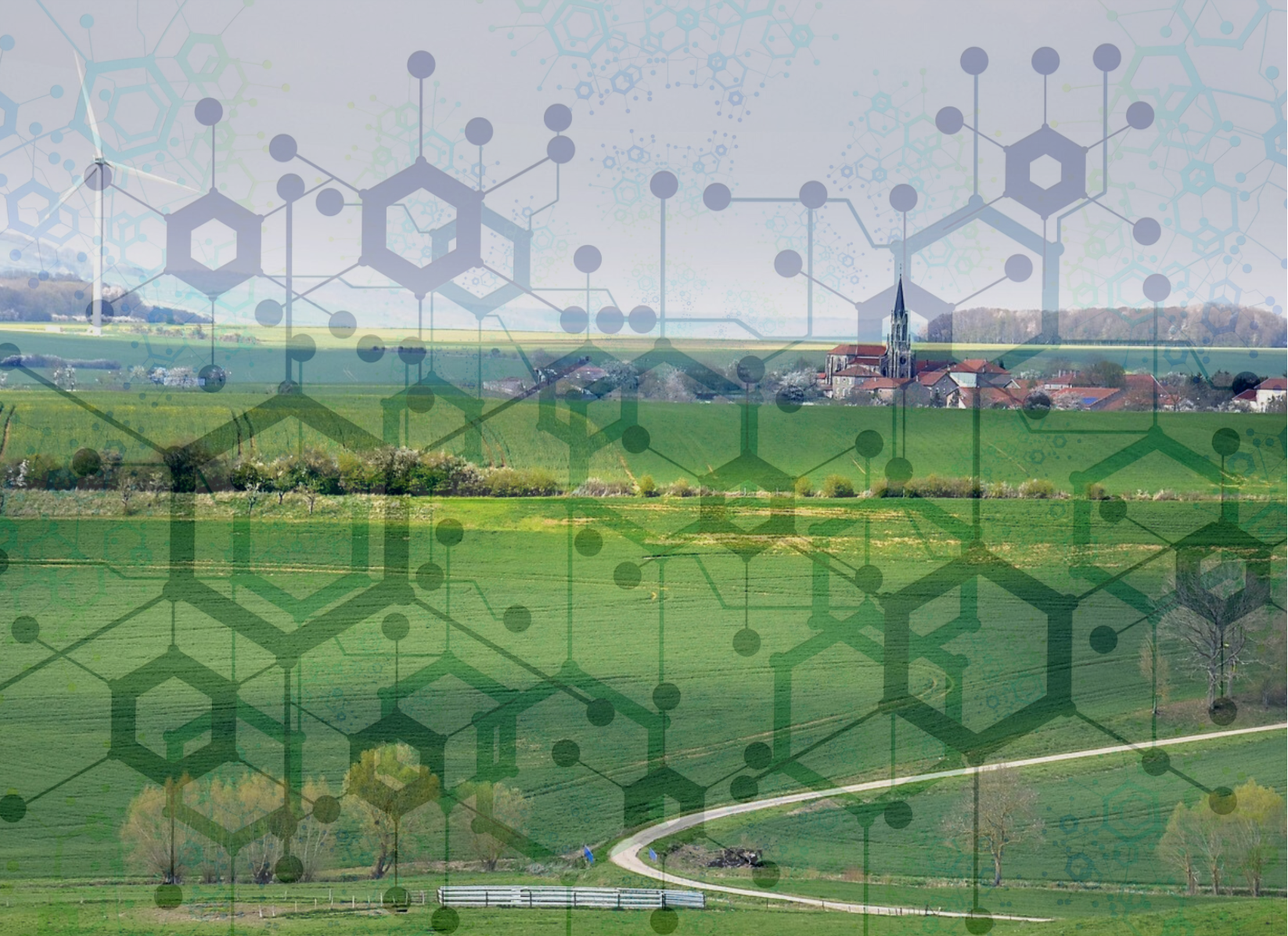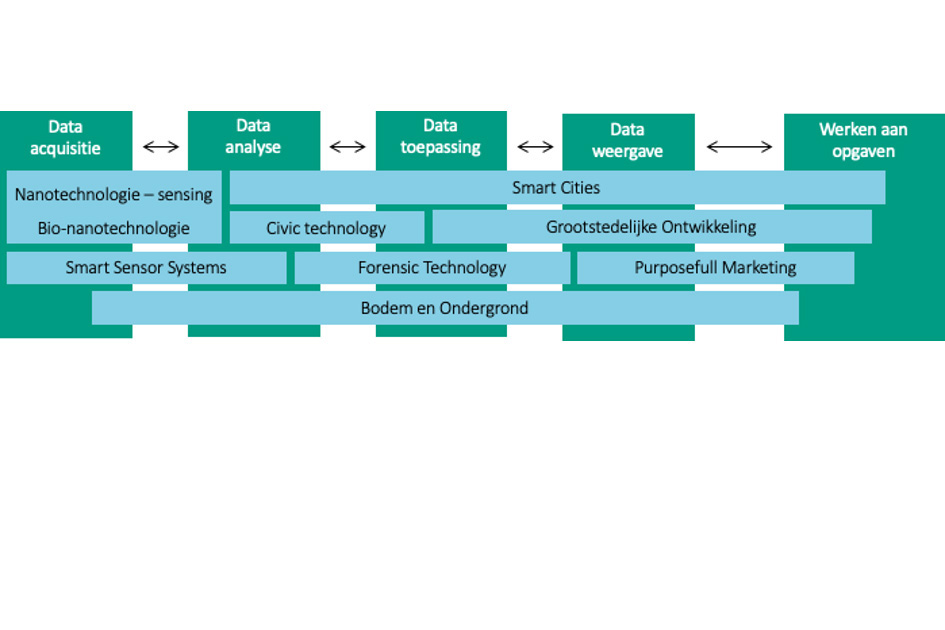GROUNDED: making the invisible applicable
In SPRONG GROUNDED, The Hague University of Applied Sciences and Saxion University of Applied Sciences are closely working together on a long term basis, to investigate and understand the impact of our environment, both...
Centre of Expertise Digital Operations & Finance
Centre of Expertise Governance of Urban Transitions

In SPRONG GROUNDED, The Hague University of Applied Sciences and Saxion University of Applied Sciences are closely working together on a long term basis, to investigate and understand the impact of our environment, both above and below ground, on our well-being. In this project, we develop technologies and practices for collecting and using big data and research on the dialogue between various stakeholders, such as residents, governmental authorities and businesses. The goal is to keep people and the environment healthy.
SPRONG group
A SPRONG group is a collaboration between universities of applied sciences and practice partners, such as companies and public and governmental authorities. The ambition is during the next eight years, to grow into a leading international network for research into the role of data on and for the use of land in a sustainable living environment.
GROUNDED increases scientific understanding of topsoil and subsoil: the soil on which we are living and working and the subsoil that we are using for agriculture, cabling and storage. The SPRONG group combines knowledge in the area of sensoring, analyses, visualisation and interpretation of data, with knowledge of how this data can help citizens and organisations shape their environment. GROUNDED invests in research capacity and strengthens knowledge at the interfaces.
Researchers use digitisation to make the invisible applicable. They offer information that provides answers to pressing issues for cities and towns, how we are handling the climate and space for renewable energy, nature and recreation. This enables citizens, governmental institutions and businesses to use data to allow the best lay-out for the topsoil and subsoil. Examples include road construction, road use, water storage, pipelines, (wireless) communication structures. In doing so, the SPRONG group works in both urban and rural contexts, so that the knowledge gained reinforces each other.
Societal challenges as a starting point
Research always starts with exploring various societal challenges for a healthy, safe and sustainable living environment: climate adaptation, environmental exposures such as air quality and substance deposition, soil quality, water quality, biodiversity, traffic intensity, etc. Next, the focus is always on a number of questions: what information is needed to answer the question? What data of what quality is required to empower citizens and administrators? Where do you get this data from? As researchers, how do we translate this data into useful information for stakeholders? Doing so, we consider the acceptance of data-driven management and policy-making as an integrated system. Practice partners contribute their issues and actively participate in GROUNDED activities, for example by sharing data and techniques.
Expected results
The research team works with chain partners to translate concrete challenges into a short- and longer-term research agenda. The research is broad-based and focuses on the interaction between soil, subsoil and living environment. For every challenge, the GROUNDED team expects to provide reliable, secure and accepted information to authorities, knowledge institutions and companies.
The work could lead to various ground-based infrastructure applications. One of the future aims, for example, is the use of digital twins to calculate scenarios for area planning. For example, to estimate how water quality changes when you circulate water differently. Or how different traffic circulation causes changes in harmful emissions and accessibility. In short: tools to make informed policy choices.
Based on the research results, it is easier for authorities and companies to calculate various scenarios. They can communicate the consequences more clearly and make them comprehensible for citizens. The results of GROUNDED could have a pull effect for knowledge institutions, allowing the consortium to grow over the next eight years into a powerful GROUNDED research group conducting internationally leading research on the role of soil data in a sustainable living environment.
Cooperation partners and areas of activity
Saxion University of Applied Sciences:
- Research Group Soil and Subsoil - Lector Geert Roovers
Research area: the relationship between soil, subsoil and its functional spatial use; - Research Group Smart Cities - Lector Mettina Veenstra
Research area: data as information and control tool in the urban environment; - Research Group Advanced Forensic Technology - Lector Jaap Knotter
Research area: technology to support forensic investigations; - Research Group Nanotechnology - Lector Cas Damen
Research area: physical research and sensing in particular and Lecturer Martin Bennink's with research area bionanotechnology.
The Hague University of Applied Sciences:
- Research Group Smart Sensor Systems - Lector John Bolte
Research area: data acquisition and analysis; - Research Group Civic Technology - Lector Jos van Leeuwen
Research area: deployment of interactive technology in citizen-government dialogue; - Research Group Purposeful Marketing - Lector Hongli Joosten-Ma
Research area: successful engagement and communication between stakeholders such as government, business and citizens.
35 companies with five core partners:
- Deltares - MTI for water, subsoil and infrastructure; contributes with knowledge on soil policy;
- Police Academy - basic and specialist Research & Development for the Dutch police; contributes with knowledge on the illegal use of soil, environmental damage and offences.
- Antea Group - consulting and engineering agency for spatial and urban development, water, infrastructure, environment, safety and project management; contributes with knowledge on interventions in the living environment and the use of data and technology;
- ESRI - software company for geographic information systems, web-GIS and geodatabase management applications; contributes with knowledge on geoanalysis;
- De Kien - city campus and partnership of Topicus, Tauw, Municipality of Deventer, Witteveen & Bos, Aventus, Saxion University of Applied Sciences, Province of Overijssel, MSML and Deventer Schouwburg; contributes with knowledge on interaction between technology and living environment.
Intended duration of the project
March 2023 until March 2027, with possibility of four-year extension.
Degree programmes involved
- Bachelor: Archaeology (Saxion), Spatial Development (Saxion and The Hague University of Applied Sciences), Electrical Engineering (Saxion and The Hague University of Applied Sciences), Forensic Research (Saxion), Civil Engineering (Saxion and The Hague University of Applied Sciences);
- Master: Nanotechnology (Saxion) and modules of the MBA (Saxion and The Hague University of Applied Sciences).
Funding
This project is funded by a SIA SPRONG grant.
Lead agency
- Dr Geert Roovers - Saxion University of Applied Sciences
- Dr John Bolte - The Hague University of Applied Sciences
Contact
- Research Group Smart Sensor Systems, Lector John Bolte, [email protected] and associate Lector Sam Aerts [email protected]
- Research Group Civic Technology, Lector Jos van Leeuwen, [email protected];
- Research Group Data Driven Marketing, lector Cor Beyers, [email protected]
